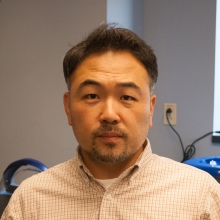BME Seminar Series (Zoom): Pathomimetic Human Intestinal Disease-on-a-Chip: From Organomimicry to Precision Medicine

Zoom: https://uci.zoom.us/s/97629106431 Password: 198Sem
Abstract: The drug discovery process has been considerably hampered by the need for in vivo animal models that are time- and resource-intensive, ethically questionable, and poor in predicting drug efficacy and safety in humans. Current in vitro or ex vivo experimental models, including static cell cultures and three-dimensional (3D) organoid cultures, are not able to perform a stable long-term co-culture with living gut microbiome that has substantially contributed to intestinal homeostasis, metabolism, and immune modulation. Thus, it is a critical unmet need to develop a human-relevant intestine model that emulates the host-microbiome ecosystem and mechanically dynamic microenvironment in a defined anoxic-oxic interface. Here, we suggest a biomimetic human gut-on-a-chip microphysiological system that mimics a 3D lumen-capillary interface under peristalsis-like motions and flow. The intestinal epithelium in the gut-on-a-chip can spontaneously undergo intestinal villus morphogenesis and reprogramming that shows increased mucus production, tight junction barrier, and drug-metabolizing functions. We showed stable host-microbiome co-cultures with a yogurt microbiome, pathogenic bacteria, or an over-the-counter probiotic product from days to weeks. We also demonstrated various microbiome-induced intestinal pathophysiological milieus such as a “leaky gut” syndrome, pathogenic infection, biofilm formation and inflammatory immune-microbiome crosstalk. By integrating patient-derived organoids, we can better simulate the pathophysiology of gastrointestinal diseases such as inflammatory bowel disease (IBD) or colorectal cancer (CRC) by co-culturing the fecal microbiota. We envision that the gut-on-a-chip microphysiological system will potentially lead to creating patient-specific intestinal disease models, dissect the microbial contribution to the disease etiology, and contribute to customized precision medicine.
Bio: Hyun Jung Kim’s Biomimetic Microengineering Laboratory at UT Austin has focused on innovating bioinspired engineering principles to develop biomedical platform technologies to uncover the fundamental questions in human health and diseases. By leveraging the miniaturized human "Organ-on-a-chip" microphysiological system, Kim has created paradigm-shifting biomimicry to reconstitute the physical structure, physiological function and mechanical dynamics of the living human intestine. His research group has been particularly interested in emulating the host-microbiome ecosystem that orchestrates human health and diseases by integrating transdisciplinary approaches of clinical microbiology, microfluidics and tissue engineering.
Share
Upcoming Events
-
EECS Seminar: Less Compute, More Intelligence – Efficient and Autonomous Generative AI and Agents
-
MAE 298: Microscopic Robots that Sense, Act and Compute
-
CBE 298 Seminar: Interface Modification for Electrocatalysis
-
CEE Ph.D. Defense Announcement: Machine Learning and Remote Sensing for Environmental Modeling - From Large-Scale Streamflow Forecasting to Malaria Risk Mapping
-
CBE Special Seminar: Operando Electrochemical Methods at Dynamic Energy Materials Interfaces
